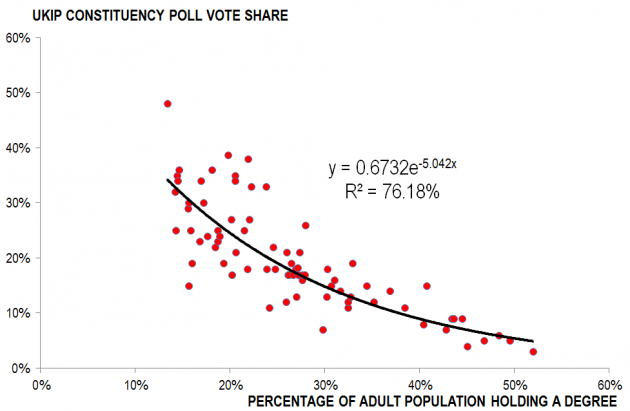According to the analysts at firstpasthepost.net, who have analysed bookmaker’s odds for each seat in the upcoming General Election, there are seventeen constituencies where UKIP have a 25% or greater chance of winning election to the House of Commons. These include the two seats that they are defending; Clacton, and Rochester and Strood. Also on the list are a number of seats in Kent and Essex, including the seat Nigel Farage is targeting of Thanet South, as well as a couple of seats in the West Midlands and a seat in Cornwall; Camborne and Redruth.
I wanted to see what stood these constituencies apart in terms of their demographic makeup, to see if there are other potential UKIP targets that the bookmakers have missed. I took these constituencies and looked at a range of data from the 2011 census to see what differentiated them from other constituencies, where the bookmakers don’t believe that they pose a credible threat.
Considering that UKIP have placed immigration at the heart of their manifesto, it is perhaps ironic that the areas where they are strongest are amongst the areas in the UK with the lowest levels of immigration. The average percentage, in England and Wales, of people born in the 2004 EU accession countries (Poland, Lithuania, etc.), Asia, the Middle East, Africa or the Caribbean is 9.2%. In the seventeen seats where the bookies make UKIP competitive, the average number of immigrants from these areas is 4.6% (4.1% if the outlier, Thurrock, is excluded). It is apparent that concern over immigration appears to be strongest in areas where immigration is the lowest.
Another demographic factor that indicates propensity to vote UKIP is unemployment, or economic inactivity. Economic inactivity will be closely related to age, which is another indicator of UKIP-propensity. Across England and Wales, the average level of combined unemployment and economic inactivity is 29.2%; in the UKIP-leaning seats, this rises to 34%. UKIP favouring areas are also more working class than the national average. The average number of those in the C2, D, or E NRS social grades in England and Wales by constituency is 46.8%, whilst in the seventeen UKIP targets this rises to 56.4%.
So whilst country of birth, economic activity, age and class are all signs that a seat may be a potential UKIP target, there is one demographic factor that trumps them all; education, or specifically, the percentage of the adult population that holds an undergraduate degree or higher. The UKIP leaning seats have, on average, 17.8% of the population with a degree, as opposed to the national average of 25.4%. Of the 18 constituencies in England and Wales with the lowest number of degree holders, six of these are on the list that could go to UKIP according to the bookies.
In this election, there has been a range of polling carried out a constituency level. Nationwide polling was a useful way of gauging the electoral weather when the British electoral system was a two-party system (with a few token Liberals and Nationalists). Now, with the rise of UKIP and the Greens, combined with the Liberal Democrat’s highly localized tenacity in holding on to support in defiance of the national trend, there is more of a focus on the fact that the election is 650 first-past-the-post contests, and not a nationwide election between Labour and the Conservatives.
I took the results of 78 local polls, primarily the results of polls commissioned by Lord Ashcroft, but including other pollsters too. I then plotted the forecast UKIP share in each constituency on the y-axis, and the percentage of adults who hold a degree on the x-axis. There is a surprisingly strong trend.
There is a clear relationship between the number of people in a constituency holding a degree, and the numbers that UKIP have polled in constituency polls over the last year. There are, of course, a number of outliers; the dot with UKIP numbers of nearly 50% is Clacton, where UKIP have a sitting MP. There are also a number of constituencies where UKIP poll a lot less strongly than the number of degree holders would indicate, such as Bradford East, which has high levels of immigration. UKIP support has fluctuated throughout the year, but it is apparent that UKIP support is concentrated in areas with both low immigration and low levels of those with degrees.
So, are there any other constituencies which fit the profile of a potential UKIP target, but the constituency pollsters and the bookies have both missed? Setting a filter of immigration levels less than average of 9.2%, and the percentage of degree holders less than the 18% level which the curve would indicate that they could be competitive at, leaves 52 seats where UKIP could be competitive. These include Plymouth Moor View, where an Ashcroft poll put UKIP neck and neck with Labour, Rother Valley, and intriguingly the Doncaster North seat of the Labour leader, Ed Miliband (of course, Mr Miliband is likely to have a high personal vote, and isn’t really at risk).
Whilst it is unlikely that Mr Farage’s party will net anything in May much more than the seven seats where the bookmakers rate UKIP a 50% chance or higher, it is very possible that they could net over 100 second place finishes, and set themselves up for a run at the Westminster seat in the following election. Many sitting MPs, in both historic Conservative and Labour heartlands, will be feeling very nervous in 59 days’ time.
All data used in this analysis can be found in a Google spreadsheet here.
A qualified accountant and data analyst, interested in politics, economics and data. Twitter: @peterdonaghy
Discover more from Slugger O'Toole
Subscribe to get the latest posts to your email.
